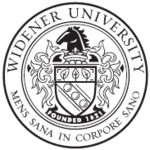Brandywine College
 |
|
| Motto |
Mens Sana In Corpore Sano (Sound Mind in Sound Body) |
|---|---|
| Type | Private |
| Established | 1821, Preparatory school 1862, College |
| Endowment | $73 million (2012) |
| President | Julie E. Wollman |
|
Academic staff
|
326 full-time |
| Students | 6,464 |
| Undergraduates | 3,204 (2,790 day, 414 evening) |
| Postgraduates | 3,260 (1,598 law students) |
| Location | Chester, Pennsylvania, USA |
| Campus | Urban, 108 acres (.44 km²) |
| Colors | Widener Blue and Gold |
| Athletics | 20 varsity teams, Division III (MAC) |
| Nickname | Pride (introduced in 2006), formerly the Pioneers and the Cadets (when PMC) |
| Website | www.widener.edu |
Widener University is a private, coeducational university located in Chester, Pennsylvania. Its main campus sits on 108 acres (.44 km²), just 14 miles (23 km) southwest of Philadelphia. The university has three other campuses: two in Pennsylvania (Harrisburg and Exton) and one in Wilmington, Delaware.
Founded as The Bullock School for Boys in 1821, the school was established in Wilmington, Delaware. It became the The Alsop School for Boys from 1846–1853, and then Hyatt's Select School for Boys from 1853-1859. Military instruction was introduced in 1858 and in 1859 the school changed its name to Delaware Military Academy. It moved to Pennsylvania in 1862 and became Pennsylvania Military Academy. It was known as Pennsylvania Military College after 1892 and adopted the Widener name in 1972.
About 3,300 undergraduates and 3,300 graduate students attend Widener in eight degree-granting schools. The university offers associate's, baccalaureate, master’s, and doctoral degrees in areas ranging from traditional liberal arts to professional programs. The Carnegie Foundation classifies Widener as a Doctoral/Research University and a Community Engagement Institution. Widener was ranked #181 in the National Universities category by US News & World Report for 2012.
Founded in 1821 as a preparatory school for boys in Wilmington, Delaware, the institution now known as Widener University moved to Pennsylvania in 1862 and was granted collegiate powers and privileges via universal charter by the Pennsylvania legislature in April of the same year. It was known from 1892 to 1972 as Pennsylvania Military College, though it had officially become PMC Colleges in 1966 when a nonmilitary, coeducational component was added. Graduate programs were also introduced in 1966.
...
Wikipedia
